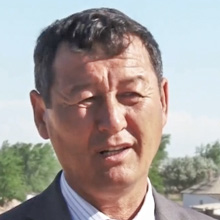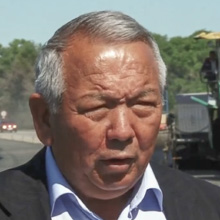The 4,000 workers from South Kazakhstan district are on the job every day except for national holidays, finishing up their link in an enormous road that will tie western China to western Europe. The new road will save billions in transport costs, time, and efficiency, but even now, when parts of it still look like flattened dirt, it is having a huge impact on peoples’ lives.
Most of the workers are locals. They do everything from laying the road’s surface to quality checks to serving meals at the road workers’ dormitories. “I’m feeding my family and I have work. I’m glad to have it, it’s good!” exclaims Nurlan Turlubekov, a construction worker. His wife is pregnant with their first child.
Turlubekov’s co-worker, a few kilometers down the road, agrees. Yerkanat Zhumaliyev has been on the road crew since he finished college. “I’ve been working here since I was 18,” he says. “I like the job, I get paid every month, and the food is good.”


